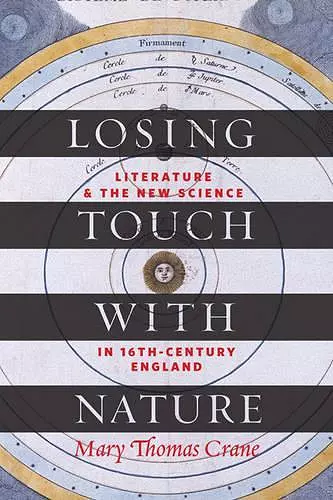Losing Touch with Nature
Literature and the New Science in Sixteenth-Century England
Format:Hardback
Publisher:Johns Hopkins University Press
Published:9th Dec '14
Currently unavailable, and unfortunately no date known when it will be back

Losing Touch with Nature offers a lucid, well-argued account of the prehistory of the scientific revolution in England. Crane's timely study provides a useful model for bridging the gap between literary and scientific production during a period in English thought that has been relatively neglected by historians of science and literary critics alike. Rich in its interdisciplinarity and refreshing in its convincing refutation of many preconceptions about the state of scientific thought in the sixteenth century, this book will appeal to a wide audience. -- Shankar Raman, Massachusetts Institute of Technology
This fascinating book traces the growing awareness of that epistemological gap through textbooks and natural philosophy treatises to canonical poetry and plays, presciently registering and exploring the magnitude of the human loss that accompanied the beginnings of modern science.During the scientific revolution, the dominant Aristotelian picture of nature, which cohered closely with common sense and ordinary perceptual experience, was completely overthrown. Although we now take for granted the ideas that the earth revolves around the sun and that seemingly solid matter is composed of tiny particles, these concepts seemed equally counterintuitive, anxiety provoking, and at odds with our ancestors' embodied experience of the world. In Losing Touch with Nature, Mary Thomas Crane examines the complex way that the new science's threat to intuitive Aristotelian notions of the natural world was treated and reflected in the work of Edmund Spenser, Christopher Marlowe, William Shakespeare, and other early modern writers. Crane breaks new ground by arguing that sixteenth-century ideas about the universe were actually much more sophisticated, rational, and observation-based than many literary critics have assumed. The earliest stages of the scientific revolution in England were most powerfully experienced as a divergence of intuitive science from official science, causing a schism between embodied human experience of the world and learned explanations of how the world works. This fascinating book traces the growing awareness of that epistemological gap through textbooks and natural philosophy treatises to canonical poetry and plays, presciently registering and exploring the magnitude of the human loss that accompanied the beginnings of modern science.
Losing Touch with Nature is a stimulating read. Crane gives clear explanations of complex philosophical and scientific subjects-particularly those which are unfamiliar to the modern mind-and sets out her argument lucidly. The view she advances is groundbreaking, providing a new perspective on an important period of history. Her book deserves a wide readership, both within academia and more generally, than just among literary historians. -- Clive Prince Magonia Review Crane's discussion is an exceptionally intelligent guide to the history of early modern science for nonscientists, as well as a useful corrective to some of the unexamined donnees of current writing about early modern science and literature. Perhaps because she is not a scientist or a historian of science, her care in explicating the state of scientific knowledge, its sources and traditions, together with the competing, mingling systems that offered such fecund ground for imaginative writers, is precise, clear, and suggestive. Renaissance Quarterly Crane's synchronic approach to multiple contexts related to science and literature resonates with current interdisciplinary views... Crane's approach to her material is comprehensive and represents an important resource for research. British Society for Literature Of the books that I found most rewarding among this year's crop...I would flag Mary Thomas Crane's Losing Touch with Nature: Literature and the New Science in Sixteenth Century England. Studies in English Literature
ISBN: 9781421415314
Dimensions: 229mm x 152mm x 21mm
Weight: 476g
248 pages